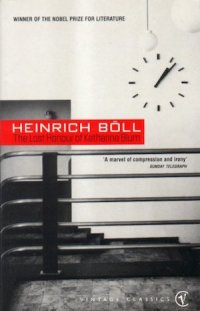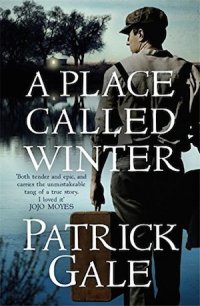‘The Lost Honour of Katharina Blum or How violence develops and where it can lead’ by Heinrich Böll
Fiction – paperback; Vintage; 140 pages; 2000. Translated from the German by Leila Vennewitz.
 First published in Germany in 1974, The Lost Honour of Katharina Blum is widely regarded as a German classic and is listed in Peter Boxall’s 1001 Books You Must Read Before You Die, where it is described as a dark morality tale about the “unscrupulous sensationalism of the mass media”. I think it could also be described as an examination of a misogynistic society hellbent on keeping women in their place and denying them the right to lead independent lives.
First published in Germany in 1974, The Lost Honour of Katharina Blum is widely regarded as a German classic and is listed in Peter Boxall’s 1001 Books You Must Read Before You Die, where it is described as a dark morality tale about the “unscrupulous sensationalism of the mass media”. I think it could also be described as an examination of a misogynistic society hellbent on keeping women in their place and denying them the right to lead independent lives.
This short but powerful novella charts the downfall of Katharina Blum, a strong, independent woman, who meets a man at a party and takes him home, not realising he’s a wanted criminal. When he goes on the run, she is interrogated by the police who insist she’s an accomplice to his crimes even though she had never met him before. The city newspaper drags her name through the mud, portraying her as a whore and a communist. Her reputation in ruins, Katharina is forced to take drastic action, shooting the reporter who has distorted her story out of all proportions.
Written in a dry, somewhat detached style employing an omnipresent narrator, I can’t say that I was immediately grabbed by the story. But the message is a powerful one — and still rather relevant in today’s climate of social media shaming and bullying.
‘Undermajordomo Minor’ by Patrick DeWitt
Fiction – Kindle edition; Granta; 304 pages; 2015.
 Longlisted for this year’s Giller Prize, I read Patrick DeWitt’s Undermajordomo Minor for my Shadow Giller Jury obligations and found it an enjoyable, if somewhat surreal, romp hugely reminiscent of the kind of kooky fables that British writer Magnus Mills pens. The sinister elements of the story reminded me a little of Bram Stoker’s ‘Dracula‘, but it’s not a horror story per se, more a dark, often hilarious, Gothic fairy tale set in an unnamed country in an unspecified era.
Longlisted for this year’s Giller Prize, I read Patrick DeWitt’s Undermajordomo Minor for my Shadow Giller Jury obligations and found it an enjoyable, if somewhat surreal, romp hugely reminiscent of the kind of kooky fables that British writer Magnus Mills pens. The sinister elements of the story reminded me a little of Bram Stoker’s ‘Dracula‘, but it’s not a horror story per se, more a dark, often hilarious, Gothic fairy tale set in an unnamed country in an unspecified era.
The tale begins when one young man, Lucien (or “Lucy”), moves out of the family home to begin a new job — and life — working as a helper for the old “majordomo” of a creepy castle in a distant village. Lots of strange and unexplained things happen to Lucy, who befriends some local thieves and falls in love with a pretty girl, whom he woos using every trick in the book.
There’s no real plot line — the story works on character and a series of kooky set pieces — but it’s a fun, if somewhat unsettling (and occasionally violent) read from the author of The Sisters Brothers.
‘A Place Called Winter’ by Patrick Gale
Fiction – paperback; Tinder Press; 368 pages; 2015.
 Patrick Gale’s A Place Called Winter is epic storytelling at its best. Written with warmth and great sensitivity, it charts the formative years of Harry Crane, a shy, stuttering gentleman of independent means, in Edwardian London, before a sex scandal forces him to abandon his wife and young daughter for a new life on the Canadian prairies.
Patrick Gale’s A Place Called Winter is epic storytelling at its best. Written with warmth and great sensitivity, it charts the formative years of Harry Crane, a shy, stuttering gentleman of independent means, in Edwardian London, before a sex scandal forces him to abandon his wife and young daughter for a new life on the Canadian prairies.
The book opens with a middle-aged Harry undergoing treatment in an experimental sanatorium, but we do not know how he got there or what condition he is being treated for. The story then flashes back to his earlier life, and these two narrative threads — a current story framed by flashbacks — alternate to provide a rich tapestry of Harry’s life and search for self-discovery.
Admittedly, this kind of story isn’t normally my cup of tea, but I enjoyed the change of pace and found the writing style reminiscent of Anita Shreve, who is one of my go-to authors. The book has been shortlisted for this year’s Green Carnation Prize and the 2015 Costa Novel Award.
‘Terra Nullis: A Journey Through No One’s Land’ by Sven Lindqvist
Non-fiction – paperback; Granta; 248 pages; 2012. Translated from the Swedish by Sarah Death.
 Proving that my reading tastes are wide-ranging, this non-fiction book explores my interest in the issue of racism against Aboriginal Australians. First published in Sweden in 2005, it charts the history of black and white relations in Australia from the first point of contact in the 18th century to the current day.
Proving that my reading tastes are wide-ranging, this non-fiction book explores my interest in the issue of racism against Aboriginal Australians. First published in Sweden in 2005, it charts the history of black and white relations in Australia from the first point of contact in the 18th century to the current day.
The author Sven Lindqvist, an accomplished essayist and journalist, seems to have made a name for himself writing about cultural genocide (he has written similar books about black and white relations in Africa), and much of what he covers here makes for uncomfortable reading. Yet sometimes his passion (and fury) gets a little overwrought, and detracts from the important message at the book’s heart.
But on the whole, I found this an eye-opening read. Part entertaining travelogue, part searing polemic, it’s certainly one of the most thought-provoking books I’ve read all year.
‘Daydreams of Angels’ by Heather O’Neill
Fiction – Kindle edition; Quercus; 369 pages; 2015.
 I’m familiar with Canadian writer Heather O’Neill having read and reviewed two of her previous novels, Lullabies for Little Criminals and The Girl Who Was Saturday Night, but Daydreams of Angels is a slight departure for her, because it’s a short story collection. I read it because it was shortlisted for this year’s Giller Prize.
I’m familiar with Canadian writer Heather O’Neill having read and reviewed two of her previous novels, Lullabies for Little Criminals and The Girl Who Was Saturday Night, but Daydreams of Angels is a slight departure for her, because it’s a short story collection. I read it because it was shortlisted for this year’s Giller Prize.
The book is subtitled “Tall tales and twisted fairy stories” and that’s a pretty good description for the contents: there are 21 stories about cherubs, talking bears, cats that dye their own fur and children who fend off marriage proposals, amongst others. Most are set in Montreal, others on the battlefields of World War Two. Some are surreal, others more grounded in reality.
The writing is sharp and witty, filled with wonderful descriptions of places and atmospheres, and the author has a particular “thing” for a clever simile — for instance:
“When a car of boys slowed down next to her on the sidewalk, she leaned in the window and wiggled her butt back and forth as she talked to them, like a bumblebee getting nectar out of a flower”
But on the whole, I found the voice too similar throughout so that there was nothing to separate one story from another, and now, almost two months on, I find that nothing really stands out in my mind. I rated it pretty low against the other books on the Giller Prize shortlist, though my fellow jurors begged to differ…


I’ve read Katharina Blum too: I’d recommend that one too.
LikeLike
Ah, did you review it on your blog, Lisa? If so, please leave a link…
LikeLike
Yes, and there are links to Stu’s and Tony (Reading List)’s reviews at the bottom as well: http://anzlitlovers.com/2013/11/30/the-lost-honour-of-katharina-blum-by-heinrich-boll-translated-by-leila-vennewitz/
LikeLiked by 1 person
I’m still on the fence about whether or not to read Daydreams of Angels. I think I’d rather read Lullabies first.
A Place Called Winter sounds like one I’d like!
LikeLike
Yes, I’d recommend starting with Lullabies for Little Criminals first… Daydreams is an intriguing read, but I’d suggest pacing it out, reading a couple of stories at a time in between other reads. I read it in one hit, trying to get it finished for the Shadow Giller, and I must admit the stories started to blend into one another.
And yes, I think you would really like A Place Called Winter… it almost feels as if it was written by a Canadian!
LikeLiked by 1 person
The Heinrich Böll is the one that stands out for me here. I have never had any desire to read Patrick DeWitt although I know many people who adore him. The one book I do own is A Place Called Winter which, I confess, I bought in October at an event Patrick Gale was at because I wanted to talk to him about his experiences at the Cape Town Book Festival – and we did talk at length about the cost of books in South Africa and how that impacts the black readership in particular. I suspect the book will be something I read on the side as a light read. As a gay man in western Canada myself I am intrigued to see how he explores the challenges his character would have faced at that time.
LikeLike
Oh, I think you would rather like A Place Called Winter then… it’s an excellent story about a gay character who comes to terms with his own sexuality in a lovely, yet profound, way. It’s a very easy read, and you’d probably enjoy the Canadian aspects to the story.
LikeLiked by 1 person
Thanks for your thoughts. I think that I need to make room for at least one “light” read each month. Reading with an eye to reviewing and then writing reviews takes so much time that it is nice t have something on the go that I am reading just for fun, a guilty pleasure if you like.
LikeLiked by 1 person
I’m a big fan of deWitt. He’s got a wonderfully vivid cinematic style – The Grand Hotel Budapest kept popping into my head when I read Undermajordomo Minor. I’m a long-term Gale fan, too, and enjoyed A Place Called Winter. The O’Neill was on my list but I’m not so sure it should be now.
LikeLike
Ah yes, I can see why this book would bring The Grand Hotel Budapest Hotel to mind! It’s a delightfully bonkers kind of read… much like that particular film 😉
Please don’t dismiss the O’Neill… as I pointed out in my comment to Naomi I read it in the space of a few days and all the stories merged into one another… but if you ration them out I’m sure you’d find plenty to enjoy.
LikeLiked by 1 person